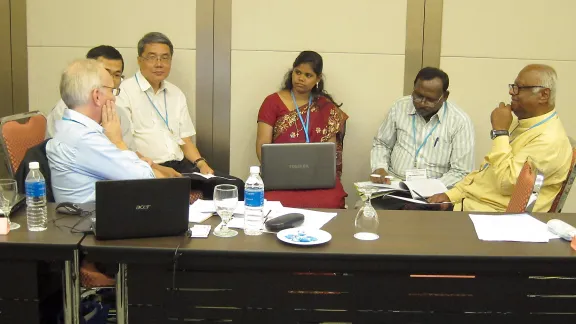
Participants in the Conference on Asian Lutheranism and Lutheran Identity. Photo: LWF/W. Chang
Renewing and Reforming the Church
(LWI) – Lutheran leaders and theologians from across Asia have formed the Asia Luther Studies and Research Network to enhance Lutheran identity in the region.
The decision came at the Conference on Asian Lutheranism and Lutheran Identity, held in Kuala Lumpur, Malaysia, 5-8 November, which drew 22 participants from 14 countries.
The meeting was the second in a series organized by The Lutheran World Federation (LWF) Department for Mission and Development (DMD) to support member churches, theological institutions and networks in responding to their contexts.
Key components of Lutheran theology identified by participants as essential to Lutheran identity - justification by faith alone, law and gospel hermeneutics, theology of the cross, Lutheran liturgy and spirituality - were examined from an Asian perspective.
Noting Lutheranism’s great contribution to Christianity, Dr Pilgrim Lo of Lutheran Theological Seminary, Hong Kong, said, “We should remember this and continue to renew and reform the church. Asian Lutherans should remain connected to this rich heritage despite their different contexts.”
Dr Darwin Lumbantobing, principal of Huria Batak Kristen Protestant Seminary, Indonesia, cautioned that establishing a Lutheran identity has positive and negative aspects. “The positive is that it helps to mark the boundaries, the negative is that it is divisive as we highlight our difference with other churches.”
However, Ms Chrissida Nithyakalyani of the United Evangelical Lutheran Churches in India (UELCI) youth desk emphasized that, “to be Lutheran is to accept others, to speak out against injustices, to bring reformation to our churches and society, to encourage and be in solidarity with the oppressed.”
Participants wrestled with the challenges faced by future generations in shaping Lutheran identity in Asia in the midst of declining Lutheran membership, including charismatic churches and mega-churches.
Rev. Andrew Cheng of Taiwan highlighted that as a minority, Taiwanese churches put aside their denominational differences to maintain a common witness.
Entrenched Confucian philosophy and folk religions are challenging, participants from Japan and Korea added, suggesting that education is needed to forge Lutheran identity.
Secularism, commercialism and the theology of glory were affecting the spirituality and identity of Lutheranism in Asia, Lo said.
Professor Eom Jin-Seop of the Luther University Seminary concluded “Lutheran identity is important to the Lutheran Church of Korea as we are small. Lutheran liturgy alone is not enough to build identity. We need to teach our members Lutheran doctrines.”
(Rev. Martin Yee, Lutheran Church in Singapore)


